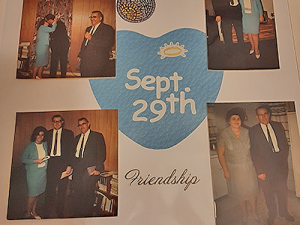Technology And Philanthropy Bring Support, Creativity To Families Living With Dementia
Mary and Doug Taylor dusted off old photo albums, flipping through photos from their wedding 52 years ago. Susan Nadel showed off crocheted animals she made herself, each one representing a beloved pet that she and her husband Doug owned over the years. Together, Cathy Parrish Jones and her mother, Hattie, created a time capsule and virtual timeline of Hattie’s life.
These are just a few moments that came about thanks to virtual groups offered by the Duke Dementia Family Support Program during the COVID-19 pandemic. The moments may seem small but are incredibly meaningful for families looking for connection as they face dementia and other memory disorders. These connections could have come to a grinding halt once the pandemic hit, but that wasn’t the case, thanks to technology, philanthropy, and a little creativity on the part of the program’s social workers.
The Duke Dementia Family Support Program has provided education, consultation, and support to people living with dementia and families caring for someone with dementia for 40 years, but in March staff was forced to quickly shift from offering support groups and other activities in person to offering them all virtually.
Challenges in the time of COVID-19
COVID-19 has presented families with unprecedented challenges in dementia care, and caregivers are especially stressed right now, says Bobbi Matchar, MSW, MHA, director of the Duke Dementia Family Support Program. With adult day programs closed, some caregivers have found themselves having to care for their loved one all day, every day. Others are distraught over not being able to visit their relative in long-term care. People living with dementia are struggling to adjust to a loss of their normal routines.
“Caregiving or living with dementia is stressful on its own, but the challenges of staying socially isolated and needing to be extra careful are really creating stress,” Matchar says.
Recognizing these challenges, the program pivoted to offer their support groups virtually and with increased frequency, and they established three completely new offerings.
“People with dementia benefit from routine and from social stimulation,” Matchar says. “COVID caused major changes in routine and in opportunities for social stimulation. Caregivers talked to us early on about how they saw their person declining in only a matter of a few weeks without the routine, without the social stimulation. So, we've been trying to address those gaps.”
Matchar says philanthropy played a major role in the Duke Dementia Family Support Program’s ability to respond swiftly to families’ needs during these challenging times. Without donations, including over $3 million in support from an anonymous donor over the last five years, she says the program would not have been able to respond to the pandemic as comprehensively as they have.
Virtual Support
Since COVID-19, all of the Duke Dementia Family Support Program’s seven support groups have moved to the videoconferencing tool Zoom.
Natalie Leary, MSW, LCSW, a social worker with the program, says the virtual support groups have been well received. Attendance for each group typically ranges from 4 to 17 participants. Because there also has been an increase in demand and need for support during COVID-19, the program has increased the frequency of the support groups and added new ones. Most groups previously met monthly, but now they meet every two to three weeks.
“People continue to show up, which lets us know that the frequency and the platform is needed,” Leary says. “They need this time and space. We try to acknowledge that this isn't how we normally do things, but we're grateful to have the space to do it. Folks have definitely been responsive and grateful.”
Relieving Social Isolation
Mary Taylor says the feelings of isolation have been tough for her and her husband, Doug, who has dementia. But through the support groups, the Durham couple has come to realize they are not alone. Without the virtual support groups, “I think we'd be struggling a little bit more,” Mary Taylor says. “It's very isolating if you don't have anyone to talk to, and so virtual or not, it makes a difference.”
Doug and Susan Nadel of Apex first joined the Memory Makers Support Group after Susan Nadel was diagnosed with Alzheimer’s disease in July 2019. Doug Nadel says the virtual group meetings have kept communication alive between them and the friends they have made over the past year. Susan Nadel especially enjoyed being able to share her crocheted animals during a “Show Me Your Art” portion of a recent meeting of “Let’s Get Together,” a new, theme-based Zoom gathering where participants living with dementia are encouraged to share their stories.
“This really is a lifeline for us. It's not that we treat it as merely another social avenue. It's not. It's much more than that.”
Doug Nadel
Leary and another social worker with the program, Janeli McNeal, MSW, created “Let’s Get Together” and other new offerings to help families through the pandemic. “Come Sing with Us” debuted in May with a Facebook concert by Durham singer Rissi Palmer. Using songbooks that were provided, participants could listen and sing along with their favorite tunes from the 1940s, 1950s, and 1960s.
“It's a way of providing social stimulation and engagement, for both the person living with dementia and their care partner,” Matchar explains.
The other new program is a webinar series, Caregiver Connections, designed to help fill the void of caregiver education created by the pandemic. Topics covered include “Managing Caregiver Stress” and the two-part series, “Making the Difficult Decisions in Dementia Care.” Attendance has exceeded expectations, Matchar says, and recordings of the webinars are archived on the program’s website.
Meaningful Connections
Mary and Doug Taylor shared their wedding photos during one of the “Let’s Get Together” gatherings that was themed, “What’s Your Love Story?” The activity led them to continue the activity well after the group meeting was over. They spent time looking through more than a dozen photo albums that they hadn’t touched in years. “That was kind of neat because we dug up pictures we hadn't seen in a long time,” Mary Taylor says. “When you pull them out, it brings back neat memories.”
Cathy Parrish Jones of Chapel Hill, cares for her mother, Hattie, two days a week. Initially, she was uncertain how her mother and other participants would respond to the change to virtual gatherings. But Jones says her mother, who before the pandemic had a busy social calendar, has adjusted well and loves being able to continue to meet regularly with her friends and connections made through the program.
“They gave us an opportunity to stay connected and not feel so isolated, and it's made a huge difference,” Jones says. In addition to being inspired to make a time capsule, Jones says the virtual activities and a website offered by the Duke Dementia Family Dementia Program have given her new ideas on ways to keep her mother, who has dementia and chronic lymphocytic leukemia, engaged—from online chair yoga classes to virtual concerts—thus making her job of planning daily activities a bit easier.
“Philanthropy allowed us to offer these programs,” Matchar says. “It's allowed us to be creative. It’s allowed us to respond to the needs of caregivers in a way that our state funding, which is allocated for a specific service, doesn't. We're very grateful to all the donors.”
You can make a difference to families living with dementia.
Make a contribution to the Duke Dementia Family Support Program





